I'd like to thank all of those who made the trip possible, their tireless effort made our day . . .
Zalmen, you're the man
Keep up the good work.
After returning from Gdansk (Which though definitely a post worthy event, it has since been eclipsed by the Ukrainian Trek) I spent the last few hurried hours of the night preparing for our grand trip . . . out of Poland and into Ukraine -my family's home land (For the record, I have British, Sephardi, Polish, Lithuanian and Romanian blood in me as well . . . yet, since the 3 out of my eight great grandparents come from Ukraine, I tend to simplify things)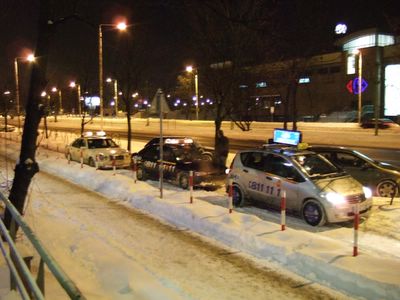
On the Road
We made our way post-haste to Warszawa Centralna (the Central Train station) . . .
Before we continue, however, as I'm sure all of you have been tracking the weather that we nine shluchim must endure here in Poland (and as mentioned on the various blogs of my (esteemed) colleagues) we were hit by the cold spell that plagued Russia as it drifted westward -see the article brought at the end of this post- and so with chapped hands and frozen noses (I learnt in Montreal that there are three ways to tell when it's cold 1. You can feel your nose hairs freeze 2. The water in your beard freezes within a few seconds of being outside 3. Rabbi Yarmush puts on a sweater) we set off . . .
The train pulled up, dressed its own winter coat of ice and snow, and heated from with in by coals(!) -only further stressing the anachronistic fear of being deported deep into Siberia brought out by the Cyrillic letters that bedecked the train- or at least that was the first emotion that I felt upon seeing the train . . .
With in a few minutes of setting out, I fell asleep.
After waking, I davened Shachris, and was told by my dear friend Chaim Mordechai van Halem
that there was another Jew in our wagon (as well as a Dutch couple traveling with their rather musical child -there's something about the Dutch and traveling extremely long distances; in Venice I once met a Dutch man who was traveling from Amsterdam to Jerusalem on (what other then) a bike!))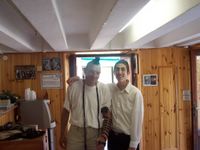 Archival shot of Abes with the Dutch guy who wanted to bike to Eretz Yisroel
Archival shot of Abes with the Dutch guy who wanted to bike to Eretz Yisroel
I spoke to him, and found out that his name was Gavriel from Baku, Azerbaijan and that the only thing worse then his English was my Russian . . . he did however speak German, so we Schprach'd away. He put on Tefillin and agreed to later daven Mincha with us, making the Minyan.
Tefillin on the train 
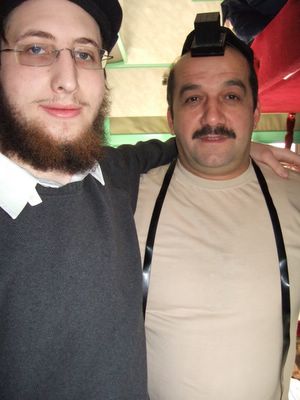
We passed through Lublin and made a stop in Chelm (yes, that Chelm)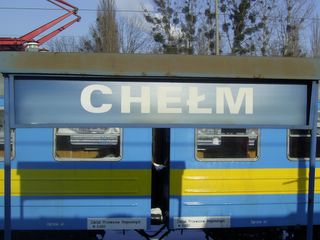
Chelm
We then cleared the border . . . for a three hour tour, a three hour tour . . . or rather wait.
You see, besides the Polish border guards, we also needed clearance from the Ukrainians, who took their sweet time in stamping our passports (unlike the Poles, they took them away and returned mine with a stamp on the very last page where stamps do not belong! -I did have my fun though when it came to dealing with the guards . . . one of them, Roman, received my particular, good willed, harassment)
If that weren't enough, we had to then wait as they changed the wheels of our train . . .
that's right, the wheels. In Russia, for some odd reason, the railroad tracks are considerably wider then those used in the the rest of Europe. We had to wait as they used hydraulics to pick up each wagon individually and change the wheels . . .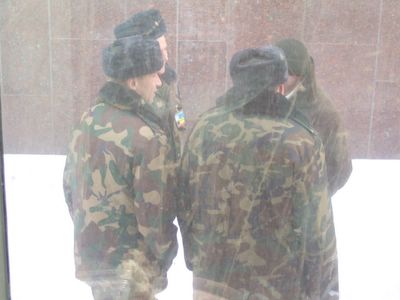
The border, Roman is the one partially concealed in the upper left hand corner.
Upon arriving in Kovel, our first stop in Ukraine, we waited for Big Z. (who arranged thetrip -thanks) to take care of the return tickets (In Poland they couldn't make a reservation for us)
As the whole Z. negotiated the exchange, the rest of us mulled around the station; only to realize that we had become the subject of interest for a group of Ukrainian teenagers -they even took pictures of us with their cell-phones (as if we wouldn't notice). Our driver, Sergey, then whisked us off to Zhitomer . . . our home base.
Good morning -in Zhitomer 
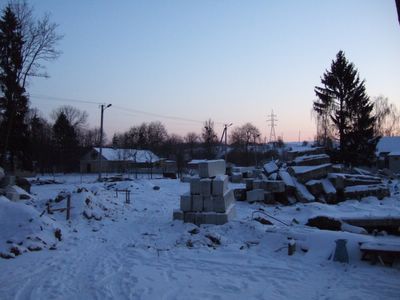
Davening 
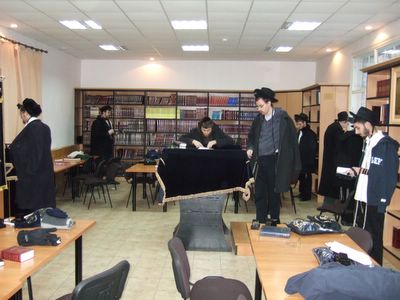
Our grounds 
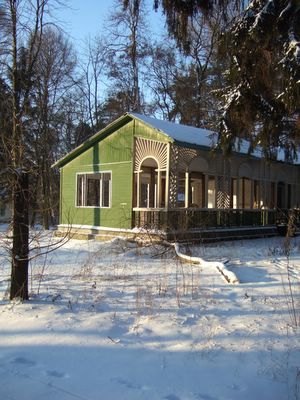
We Woke up very early in the morning and after davening, were treated to a hearty (Ukrainian) meal of potatoes and eggs, with tea. Oh yah . . . gourmet food at its best.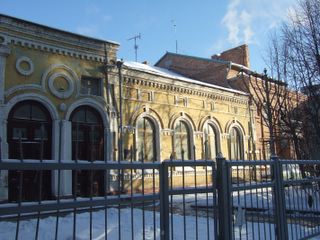
The Shul in Zhitomer
In the car -Notice van Halem's breath

Our first stop was Berditchev -hometown of the one and only Reb Levi Yitzchok Berditchever . . .
Berditchev 
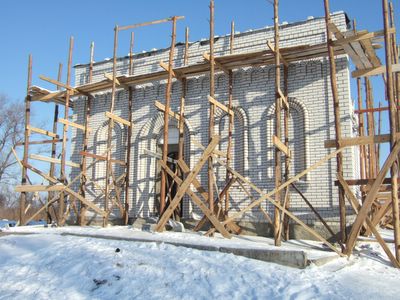
Inside the Ohel 

Our van then took us on towards Mezhibuzh, site of the Ba'al Shem Tov and others . . .
The trip took place on a long stretch of (rather bumpy) road, flanked on both sides by sparse trees and empty fields.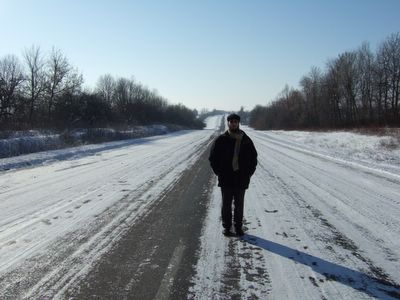
On the road
All seemed well, as we were making good time, despite the occasional stop when Sergey would dash from the car to fiddle with some bolt or other under the hood of the car . . . until . . .
Sergey turned to us and while already sliding out of the car, said "Uh oh, Problema!"
At first his exact words were subject to debate (If he had said only Problema, or Nie Problema -that in fact there was no problem) however the Problema group of Bochurim quickly one out . . . the amount of time we had to wait was their best evidence.
Sergey meanwhile took out several tools (he certainly was prepared for such an event, it makes one wonder how often it happens . . .) and set to work.
Fixing the car 

At first we passed away the time joking, singing and taking inane pictures (well, at least those of us with digital cameras). But as one hour moved into the next, and the heat in the car slowly left . . .
Suddenly someone turned around and shouted,
"Hey! There's a frum guy outside!"
We all dashed out, except for those guys who were "too cold", who instead opted to complain that by leaving the car we were letting in cold air, and ran to see our new guests.
The man told us a story he had with the Rebbe, (Some guy was trying to sue him in court for some fraudulent damages, and the Rebbe gave a Brocha. K'muvin, the Brocha came through, but the clincher was, that upon returning to the Rebbe to let him know how everything turned out, the guy told the Rebbe "We won!" to which the Rebbe responded (something to the extant that) "But when will all of the Jewish people 'win' and be taken out of Gulos!"
Meanwhile, the other passengers in the car came out . . . a husband and wife (the husband learnt in Brunoy and the wife spoke Polish (she didn't fall for our Polish however)
The car then drove off to Mezhibuzh, leaving us until the driver managed to flag down a passing truck, using a rope tied to both vehicles in order to get the car driving again (the battery had since died and being that it was a manual car, we only needed to start moving to get things running again)
One thing is for sure, they don't build Russians like they do other people . . . while we were complaining about the cold brought in by opening doors, Sergey was working under the car for over two hours!Might I add that the problema had been that the gas had frozen in the car . . .
Dancing 
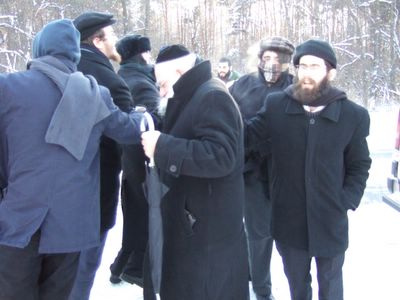
Heichal Ba'al Shem Tov 
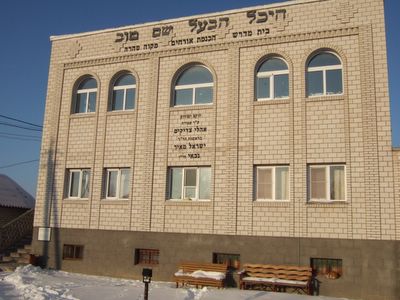
In the Shul 
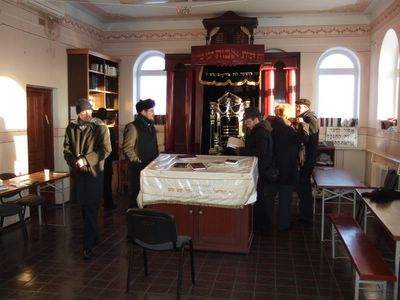
The Ohel 
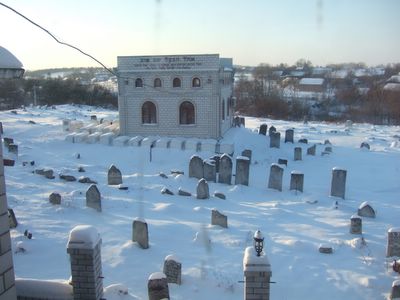
The Ohel inside 
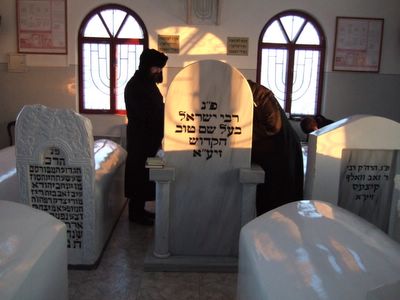
Matzevah 
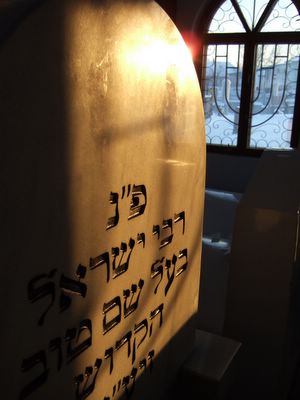
Our Friends from the road 
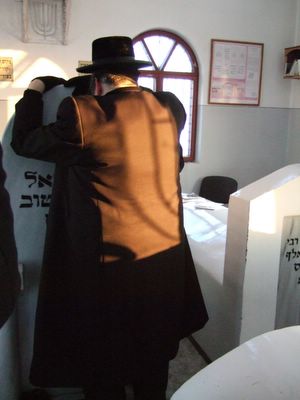
We finally arrived in Mezhibuzh, which might I add, is a rather Scenic graveyard, as graveyards go that is, being built on a hill over looking the town. The Heichel and Ohel were nice, but had that slightly tacky Israeli look . . . I half expected to find a giant crown on top of the ohel -if you know what I mean. Our roadside friends were there, and they enlivened our time spent in the Ohel . . . shouting out every saying that they'd ever heard from the "Ba'al Shem Hakadoish".
Besides davening at such a holy spot, I also used the time to pick me up one of those nifty Russian hats.
Where I got the hat 
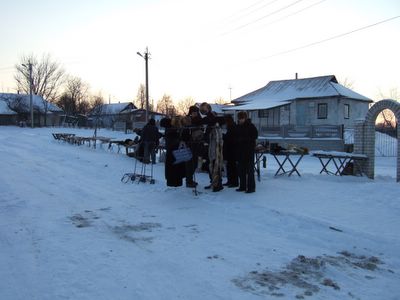
me 
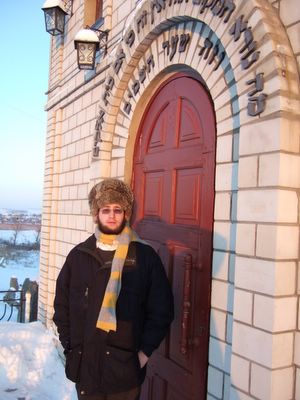
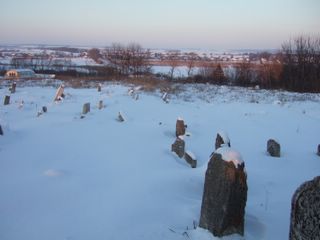
Mezhibuzh
We left with the setting Sun, in hopes of making it quickly to Anipoli, where the Magid of Mezritch, Reb Zusya and Reb Yehuda Leib Hacohen are . . .
However Sergey had other plans. We needed to stop off in an auto repair place to fix the gas problem once and for all.
Upon nearing the auto shop, we needed to push the Van into the garage . . .
As we neared the entrance I turned to Y. on my right, and told him imagine you're pushing something that you don't like. He looked at me for a second and began to push the car with all of his might. I glanced to the left for a second, and then again to my right, only to see that Y. had disappeared
He'd fallen into the long trench used by the mechanics to repair the car (see the picture bellow) Baruch Hashem, Y. was fine.
Pushing 
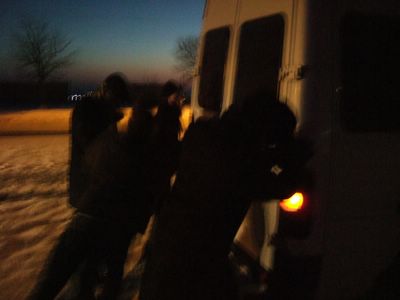
In the shop 
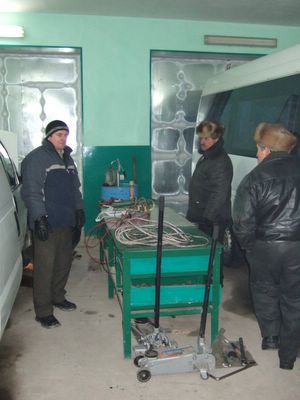
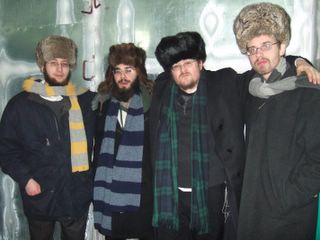
the chevra
The mechanics at first gave us strange looks, but then again, a bunch of Jews strolling into some hick Ukrainian auto repair shop all wearing fur caps, (which by the way, scream tourist just as much as those straw Venezia hats do in Venice or an "I love NYC" shirt in New York) is rather odd . . .
At first Sergey enjoyed taking a brake, but after seeing the minimal progress made by the workers, he whipped out his work smock and began to fix the car himself . . . and after all was said and done, they still had the Chutzpah to charge him!
at work
By this time it was after Ten and we were zonked . . . but we continued on with our journey, making our way to the Mezritcher Magid and co.
Anipoli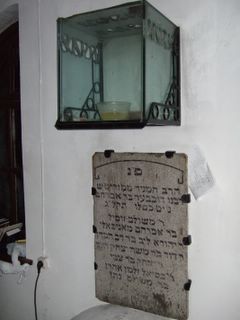
In the ohel
I'd like to use this moment to explain my personal opinion about:
1. Taking pictures.
2. and more specifically, taking pictures in a holy place.
I've encountered those Bochurim who like to take pictures of everything . . . and I mean everything -what the food looks like, the beds, the toilet, the number of the train etc.
Then there are those that must be in every single picture -you know, the kind of guys that go:
"Here I am in front of Big Ben, and here I am in front of the Eiffel Tower . . . now this picture is a nice one, here I am in a Gondola (I'd hate to meet a guy who combines these first two styles; here I am in front of my bed, and hear I am in front of the food, oh, and this one is me in front of the toilet!")
Then there people who just want plane old normal photos, the kind that look nice, bring back memories of good times spent etc. Then there are the artsy guys etc.
The first two are an anathema to good photography. . . I don't mean to negate taking pictures of oneself in interesting places or of the many interesting things that one may find on his journey, but come on, there's a limit of how many times I want to see myself in a picture . . .
All of this is amplified several times fold when it comes to holy places like an Ohel.
Yet this time I did take pictures . . . both of the places (which I don't see as a problem per say, as long as they are taken in a respectful manner) and the occasional one of myself (here I am saying Tehillim -psalms- by the Ba'al Shem Tov etc.) in the hopes that the images serve me later in my life (Much like photos of the Rebbe, that in our current time, are so important v'dal)
Anyhow that night we arrived, and seeing how late it was and how early we needed to rise, most of us opted to stay awake.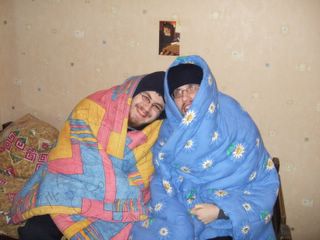
It's cold in here!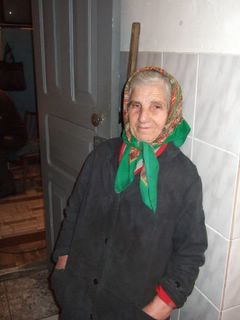
The Original Babushka
As seen on Shmais (and COL)
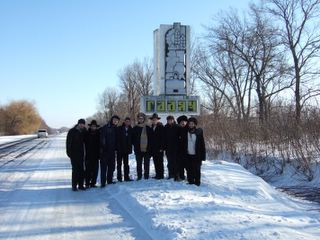
Out side of Haditch
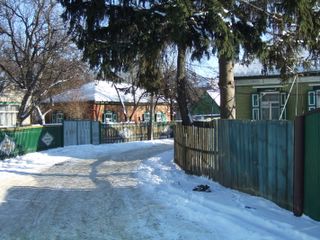
Haditch
The Ohel itself was far nicer then anything else we had seen up to that point . . . it had a Lubavitcher taste to it, as it were, a sense of simplicity and class.
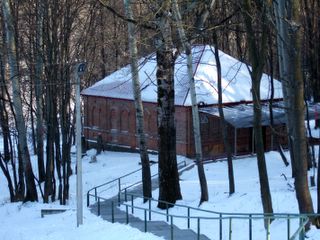
The ohel
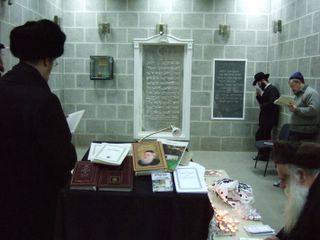
In the ohel
But the big event, though well stocked with food, seemed to be made mostly of a few Na-Nach Breslovers who seemed to have been denied entrance to Israel -and a shower, and a few of the Chabad Russian Mafia elite.
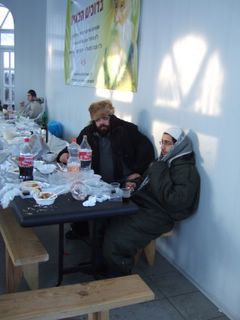
Left over from Uman
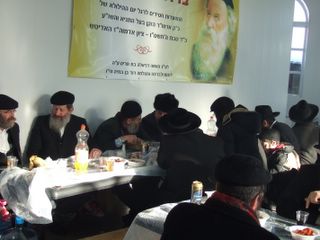
The people
Nyezhin: Buriel place of the Mittler Rebbe.
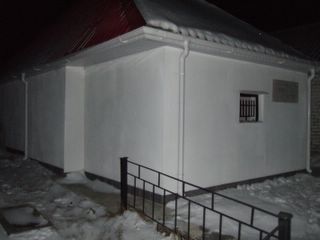
the ohel
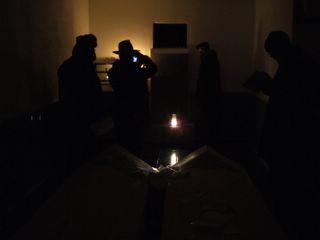
In Nyezhin
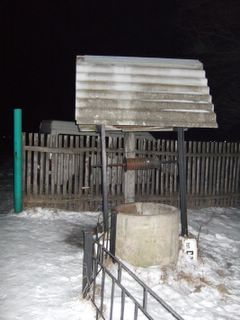
The well -somebody said that the Rebbe Rashab used it during his visit to the Tzion
We then went off to Kiev, where we ate in the Kosher restaurant (that's a big thing if you've been in Warsaw for the past three months)
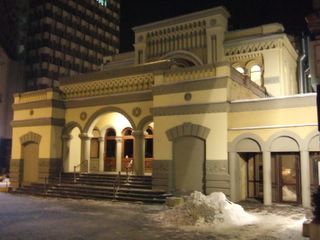
Kiev
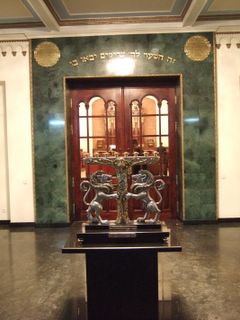
inside
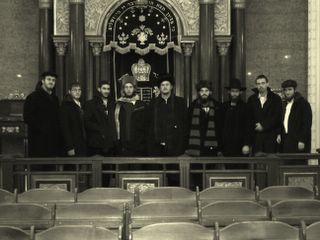
In the shul
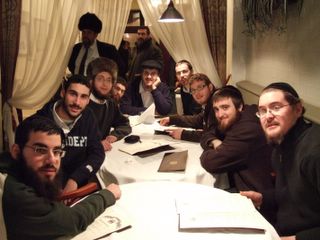
eating
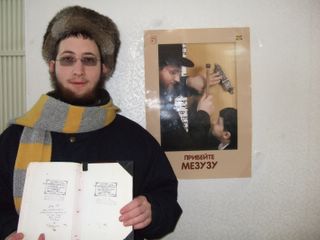
a sefer from Montreal

On the buggy
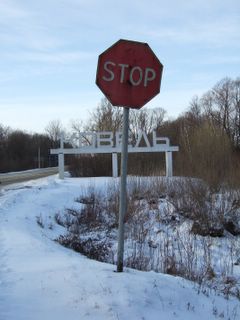
Even in Ukraine stop is stop . . . when will the French Canadians ever learn?

Good Bye in Kovel
To make a long story short . . . or a short story long . . . we made it back safely to Warsaw.
On the train ride back, we stopped at the border again for them to change the wheels etc. and who should enter to check out our papers, other then . . . you guessed it . . . Roman. (You should have seen his face when I said hello to him . . .)
We also met a Ukrainian boy, who lives in Berlin, but now learns in Kiev. Though he wasn't Jewish, he spent a lot of time with us . . . as we spoke in Germanized Yiddish (except for a few of the more Chassidishe guys who just didn't seem to get that a goy who speaks German will not understand a sentence like: "Efsher kenst du masber zain vus der inyun iz . . ." (for those of you who don't speak Yiddish, a third of the words in that sentence are Hebrew)
Hopefully we answered some of his questions . . .
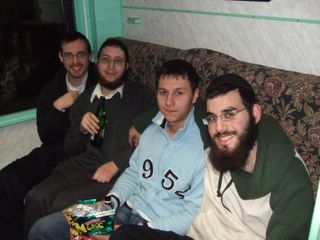
With Denis the Men . . . uhh err . . . Ukrainian
. . . as I'm sure you can tell by the number of . . . 's it's rather late here . . . so late that even I am running out of words . . .
so. . .
Let me just leave you with a picture, which . . . after all . . .
is worth a thousand . . . .
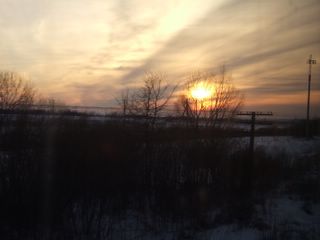
the sunset
Russia in cold's deadly grip
It's truly cold when, according to a Russian news agency, zookeepers give monkeys half a glass of wine three times a day as protection against respiratory infections.
Earflaps came down; monkeys at a zoo in Lipestsk, 250 miles south of Moscow, were said to have been treated to a French red.
For nearly a week, Russia has been slowed by temperatures not experienced for a generation. In the Siberian republic of Yakuita, meteorologists reported a temperature of minus 71. At least 31 people reportedly have died across the western part of the country.
In Moscow, schoolchildren were urged to stay home; factories cut their energy consumption to guarantee adequate heat for the city's homes. Car batteries gave up; ATMs froze.
Russians have made their endurance of cold a point of pride, and for years they complained that winters weren't what they once were. Thirty years ago, the mean winter temperature in Moscow was 14 degrees. It is now 4 degrees higher.
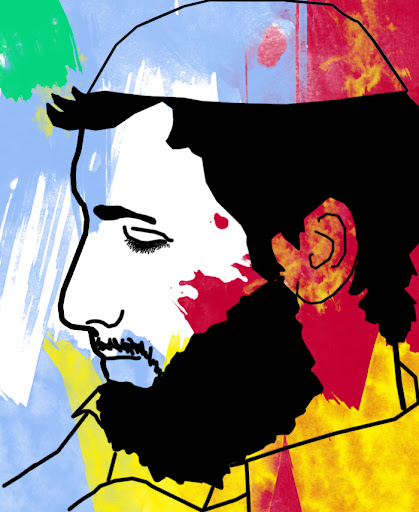







0 comments:
Post a Comment